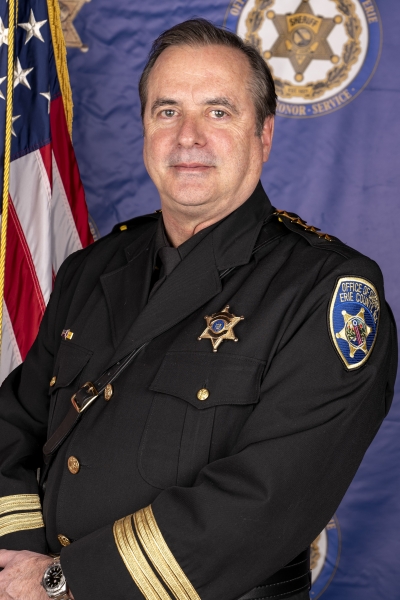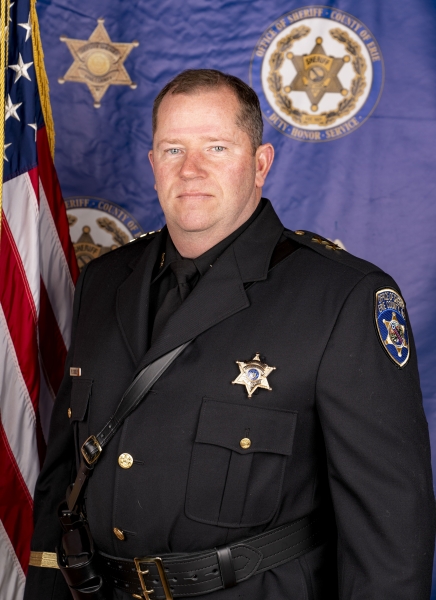
John C. Garcia, Sheriff

William J. Cooley, Undersheriff
Frequently Asked Questions (FAQ)

The Office of the Sheriff is the oldest office under the system of common law in the United States and is an integral part of government in the State of New York.
As the oldest constitutional law enforcement officer of the county, the Sheriff is charged with maintaining the peace in all municipalities, villages, and townships within his jurisdiction and the care and custody of persons pending court action. The Sheriff also serves as the Chief Executive Officer of the Courts.
The powers and the duties of the Sheriff are embodied in the constitution of each state and, as such, the Sheriff of Erie County heads the largest Sheriff's Office in New York State and the fourteenth largest in the nation.
On February 4, 1821, John G. Camp was appointed as the first Sheriff of the district, which at that time encompassed both Erie and Niagara County. After the district of Erie County was established, Camp remained in office as the Sheriff of Erie County until December 31, 1822.
United States President Grover Cleveland began his political career as Sheriff of Erie County in 1871. He went on to become Mayor of the City of Buffalo, Governor of the State of New York and President.
The Erie County Sheriff is, as most of more than 3,000 sheriffs in the United States, an elected official. He is elected to a term of office for four years, must devote full time to his duties, and may not hold any other public office.
The men and women, within the various divisions of the sheriff's Office, provide a wide range of services to the County's residents. In addition to 1,046 square miles of land area, Erie County has 90 miles of shoreline, the waters of which also come under the jurisdiction of the Office.
The Erie County Holding Center began as a jail "plainly built of Graystone" in 1877. It was built to house individuals awaiting trial and those convicted on minor charges. At that time, the facility housed about 30 prisoners.
The original building was demolished in 1937 to allow the construction of a new jail designed to house 156 inmates. The new jail, boasted as the most modern in the country, was opened in 1938. This building constitutes the nucleus of today's building.
Many additions later, the Holding Center, a pre-trial detention facility, accommodates 680 inmates in a combination of the traditional jail design of indirect supervision - Linear - and a new design of direct supervision - Podular. The blending of these two concepts brings to Erie County the first detention facility in the United States to unite these two different systems into one smoothly functioning facility.
In 1986, the Sheriff's Office was first accredited by the New York State Sheriff's Association and has just recently completed the re-accreditation process. In 1990, the Sheriff's Office became one of the first police agencies in Western New York to be certified by the State of New York as an Accredited Law Enforcement Agency.
The Erie County Sheriff's Office owes its successful development to the fifty-three sheriffs, and all the public servants, both past and present, who dedicated themselves to the service and the protection of the citizens of Erie County.
Past Sheriffs Of Erie County
Wray S. Littlefield 1823 - 1825
John G. Camp 1826 - 1828
Lemuel Wasson 1829 - 1831
Stephen Osborn 1832 - 1834
Lester Brace 1835 - 1837
Charles P. Persons 1838 - 1840
Lorenzo Brown 1841 - 1843
Ralph Plumb 1844 - 1846
General Timothy Hopkins 1847 - 1849
Leroy Farnham 1850 - 1852
Joseph Candee 1853 - 1855
Orrin Lockwood 1856 - 1858
Gustavus A. Scroggs 1859 - 1861
Robert H. Best 1862 - 1864
Oliver J Eggert 1865 - 1867
Charles Darcy 1868 - 1870
Grover Cleveland 1871 - 1873
John B. Weber 1874 - 1876
Joseph L. Haberstro 1877 - 1879
William W. Lawson 1880 - 1882
Harry H. Koch 1883 -1885
Frank T. Gilbert 1886 -1888
Oliver A. Jenkins 1889 - 1891
August Beck 1892 - 1894
George H. Lamy 1895 - 1897
Andrew Kilgallon 1898 - 1900
Samuel Caldwell 1901 - 1902
Francis T. Coppins 1902
Harry M. Kaiser 1903 - 1905
James Smith 1906 - 1908
Henry F. Jerge 1909 -1910
John W. Henry 1911 - 1912
Frederic Becker 1912 - 1914
Howard Stengel 1915 - 1917
Fred A. Bradley 1918 -1920
William Waldo 1921 - 1923
Frank A. Tyler 1924 - 1926
Charles F. Zimmerman 1927 - 1929
Charles F. Freiberg 1930 - 1932
Frank J. Offermann 1933 - 1935
Michael Maher 1935
William M. Eberhardt 1936 -1938
William Pollack 1939 - 1941
Arthur D. Britt 1942 - 1955
Michael Wagner 1955
Robert A, Glasser 1956 - 1959
B. John Tutuska 1959 - 1969
Thomas W. Ryan 1969
Michael A. Amico 1970 - 1976
Kenneth J. Braun 1977 - 1985
Thomas F. Higgins 1986 - 1997
Patrick M. Gallivan 1998 - 2005
Timothy B. Howard 2005 - 2021
 Erie County Sheriff's Office
Erie County Sheriff's Office